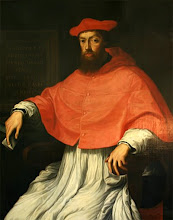(From ‘Religious Liberty Questioned’ by Msgr. Lefebvre; available from the St. Benedict Book Centre or from Angelus Press)
1) As late as 1955, a mere ten years before the promulgation of Dignitatis Humanæ, His late Holiness Pius XII said that
1) As late as 1955, a mere ten years before the promulgation of Dignitatis Humanæ, His late Holiness Pius XII said that
“Historians must not forget that if the Church and the State did have hours or years of struggle there were, from Constantine the Great even to this day, periods of tranquility, often long, in which they cooperated, with full comprehension, in the education of the same persons. The Church does not hide the fact that it [sic] considers, in principle, this cooperation as normal and that it sees as an ideal the unity of the people in the true religion and the unanimity in action between her and the State.”(Allocution to the tenth International Congress of Historical Sciences, September 7, 1955)
Pius XII also reminds us that “… that which does not correspond to truth or to the norm of morality objectively has no right to exist, to be spread or to be activated” (Allocution 'Ci Riesce' to Italian jurists, December 6, 1953). Perhaps, then, Mr. Michael Costigan was wrong to say, in a book review in the Sydney Catholic Weekly of March 16, 2008 that “It was in the era [shortly before and during Vatican II] of these documents, coinciding with the rising popularity of ecumenism, that the old Catholic saying that ‘error has no rights’ was finally abandoned”?
2) It appears that Bl. Pius IX exercised his Extraordinary Papal Magisterium in condemning the following errors in his encyclical Quanta Cura:
“that is the best condition of civil society, in which no duty is recognized, as attached to the civil power, of restraining by enacted penalties, offenders against the Catholic religion, except so far as public peace may require.”
“liberty of conscience and worship is each man's personal right, which ought to be legally proclaimed and asserted in every rightly constituted society; and that a right resides in the citizens to an absolute liberty, which should be restrained by no authority whether ecclesiastical or civil, whereby they may be able openly and publicly to manifest and declare any of their ideas whatever, either by word of mouth, by the press, or in any other way.”
In section 6 of Quanta Cura the four criteria for the Extraordinary Papal Magisterium appear to find their satisfaction:
“6. Amidst, therefore, such great perversity of depraved opinions, we, well remembering our Apostolic Office, and very greatly solicitous for our most holy Religion, for sound doctrine and the salvation of souls which is intrusted to us by God, and (solicitous also) for the welfare of human society itself, have thought it right again to raise up our Apostolic voice. Therefore, by our Apostolic authority, we reprobate, proscribe, and condemn all the singular and evil opinions and doctrines severally mentioned in this letter, and will and command that they be thoroughly held by all children of the Catholic Church as reprobated, proscribed and condemned.”
It is issued, therefore, in the Pope’s capacity as Head of the Church Militant (“by our Apostolic authority”), it is clearly a matter of faith or morals, it is definitive (the errors are defined unambiguously and are “reprobated, proscribed and condemned”), and addressed “To Our Venerable Brethren, all Patriarchs, Primates, Archbishops, and Bishops having favor and Communion of the Holy See” and intended as binding for “all children of the Catholic Church”.
2) It appears that Bl. Pius IX exercised his Extraordinary Papal Magisterium in condemning the following errors in his encyclical Quanta Cura:
“that is the best condition of civil society, in which no duty is recognized, as attached to the civil power, of restraining by enacted penalties, offenders against the Catholic religion, except so far as public peace may require.”
“liberty of conscience and worship is each man's personal right, which ought to be legally proclaimed and asserted in every rightly constituted society; and that a right resides in the citizens to an absolute liberty, which should be restrained by no authority whether ecclesiastical or civil, whereby they may be able openly and publicly to manifest and declare any of their ideas whatever, either by word of mouth, by the press, or in any other way.”
In section 6 of Quanta Cura the four criteria for the Extraordinary Papal Magisterium appear to find their satisfaction:
“6. Amidst, therefore, such great perversity of depraved opinions, we, well remembering our Apostolic Office, and very greatly solicitous for our most holy Religion, for sound doctrine and the salvation of souls which is intrusted to us by God, and (solicitous also) for the welfare of human society itself, have thought it right again to raise up our Apostolic voice. Therefore, by our Apostolic authority, we reprobate, proscribe, and condemn all the singular and evil opinions and doctrines severally mentioned in this letter, and will and command that they be thoroughly held by all children of the Catholic Church as reprobated, proscribed and condemned.”
It is issued, therefore, in the Pope’s capacity as Head of the Church Militant (“by our Apostolic authority”), it is clearly a matter of faith or morals, it is definitive (the errors are defined unambiguously and are “reprobated, proscribed and condemned”), and addressed “To Our Venerable Brethren, all Patriarchs, Primates, Archbishops, and Bishops having favor and Communion of the Holy See” and intended as binding for “all children of the Catholic Church”.
Reginaldvs Cantvar


No comments:
Post a Comment